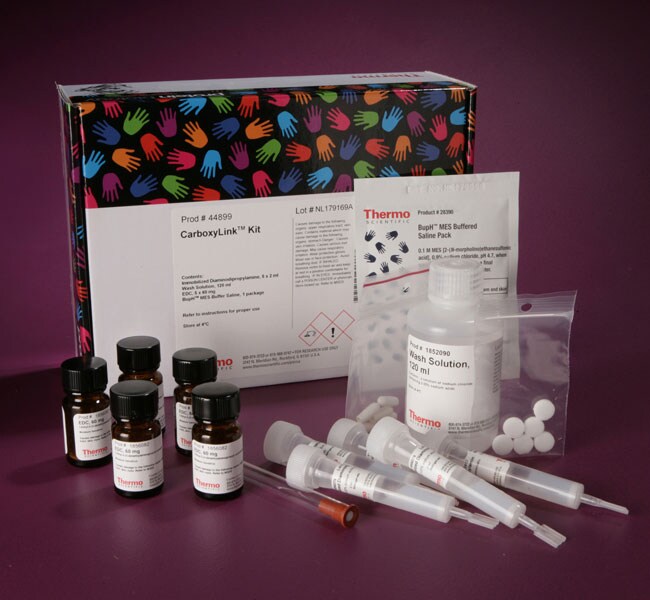The Thermo Scientific CarboxyLink Immobilization Kit is for covalent immobilization of peptides or other carboxyl-containing (—COOH) molecules to a porous, beaded resin for use in affinity purification procedures.
CarboxyLink Resin is crosslinked beaded agarose that has been activated with diamino-dipropylamine (DADPA) to contain long spacer arms, each with a primary amine at the end. When incubated with the resin and the carbodiimide crosslinker EDC (included in the CarboxyLink Immobilization Kit), carboxyl-containing molecules become permanently attached to the support by stable amide bonds. Once a molecule is coupled, the prepared affinity column can be used multiple times in typical protein affinity purification procedures. CarboxyLink Coupling Resins can also be used to immobilize other kinds of molecules using alternative amine-reactive crosslinking chemistries.
Features of the CarboxyLink Immobilization Kit:
•
CarboxyLink Coupling Resin—DADPA-activated crosslinked 4% beaded agarose
•
Efficient immobilization—Couple 1 to 2 mg of peptide per milliliter of resin (CarboxyLink Agarose Resin activated with greater than 16 μMol amine milliliter of resin; DADPA on UltraLink Support activated with greater than 40 μMol amine milliliter of resin)
•
Stable linkage—immoblization results in covalent attachment of carboxyl groups by amide bonds, allowing for multiple rounds of affinity purification with one batch of prepared resin
•
Flexible and gentle coupling conditions—immobilization reaction completed in simple MES or other non-amine and non-carboxyl, near-neutral buffer, with or without organic solvent.
•
Ideal for unmodified peptides—immobilizes peptides with high capacity and various orientations without steric hindrance, allowing for effective use in affinity purification of specific antibodies
•
Convenient kits and product sizes—choose 5-column kits with complete sets of buffers, crosslinker and versatile spin/drip columns containing either type of resin (agarose or polyacrylamide) or choose stand-alone resin for other uses.
Because EDC crosslinks carboxylates to primary amines, peptides and other molecules that contain both of these functional groups will be variously polymerized as well as immobilized to the CarboxyLink Resin. For peptides whose only carboxyl and amino groups are at the termini, coupling with the CarboxyLink Kit will result in end-to-end chains of peptide that are linked by their C-terminal ends to the support. Generally, this structure provides for high capacity and low steric hindrance for use in affinity purification. However, in the case of peptides containing multiple primary amines (lysine) or carboxylates (glutamic and aspartic acid) in the middle of their sequence, the CarboxyLink Coupling Method may cause key binding sites to be blocked, resulting in high coupling capacity but poor binding capacity for affinity purification. Alternative methods for immobilization include
AminoLink Plus Coupling Resin,
UltraLink Biosupport and
SulfoLink Coupling Resin.
Related ProductsCarboxyLink™ Coupling ResinCarboxyLink™ Immobilization Kit with UltraLink™ Support, 2 mLFor Research Use Only. Not for use in diagnostic procedures.
